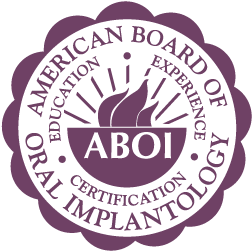How Long Does It Take To Get Dental Implants?
Generally speaking, dental implant placement takes between 3 and 6 months. However, the time involved usually depends on the individual patient’s health, the number of implants, which teeth are replaced, and if any supplemental procedures like bone grafting are required. If oral health is insufficient or tissues are not strong and healthy, extra procedures to strengthen the bone or gum tissues may be required to ensure the best possible chance of a successful dental implant process. Supplemental procedures generally add time to the total procedure time.
Step One
The first step in the dental implants process is to make an appointment with Dr. Grubb for a comprehensive candidacy evaluation. During this appointment, your entire mouth, teeth, and jawbone will be examined, as well as your medical history, and dental charts. You may also have X-rays or a CT scan. These diagnostic tools will give us a good idea of how dense you jawbone is and what needs to be done to ensure dental implant success and the most attractive results.
Step Two
This step will be performed in your doctor’s office with local anesthesia or light sedation to help ensure a pain-free experience. A small incision will then be made, before the implant posts are attached to the jawbone. Next, the patient is sent home for a period of healing while the bone fuses with the implant root piece. This fusion process helps ensure a strong and stable foundation for your new replacement teeth.
Step Three
During the third step, we carefully craft and attach your new tooth to the dental implant root that was previously attached to your jawbone. Once your implant site has completely healed, you can smile again with confidence, comfort, and exceptional functionality.
Will My Procedure Hurt?
Most patients experience mild to moderate discomfort during and after dental implant placement. This is normal. However, the exact level of pain depends in large part on each individual’s pain tolerance. Most of our dental implant patients say that the surgical procedure is no more painful than a tooth extraction. During the surgery, you will be given a general anesthetic to control your pain. After the procedure, over-the-counter pain medication can usually be used to control any residual pain.
After Your Implant Placement
After your dental implants have been placed, you will be sent home with a complete list of after-care instructions from Dr. Grubb. Bending, lifting, and strenuous activity can increase your risk of bleeding, swelling, or other complications. For this reason, you will be told to minimize pressure on the surgery site, restrict physical activities, and be sure to rest after your procedure. In addition to rest, patients need to visually inspect their implant site for any changes or abnormal side-effects. These should be reported to our office immediately.
Contact Dr. Grubb For Treatment Today
Now is a wonderful time to learn more about the amazing benefits of dental implants, so come see us for your consultation today. Family Implant & Reconstructive Dentistry offers many great financing options so your missing or damaged teeth can easily and permanently replaced with natural-looking dental implants in just a few short visits. So if you live in the Havre de Grace, MD area or beyond, we can’t wait to help you restore your smile with highly functional dental implants. Call our office now to get started on a healthy and beautiful smile with dental implants from Dr. Grubb.






